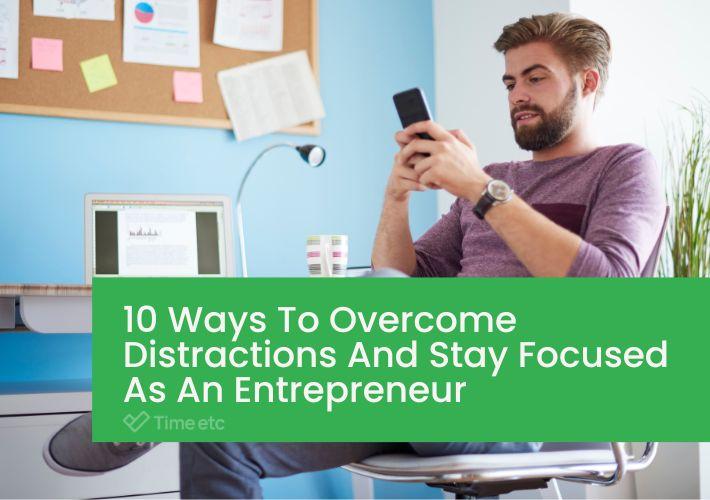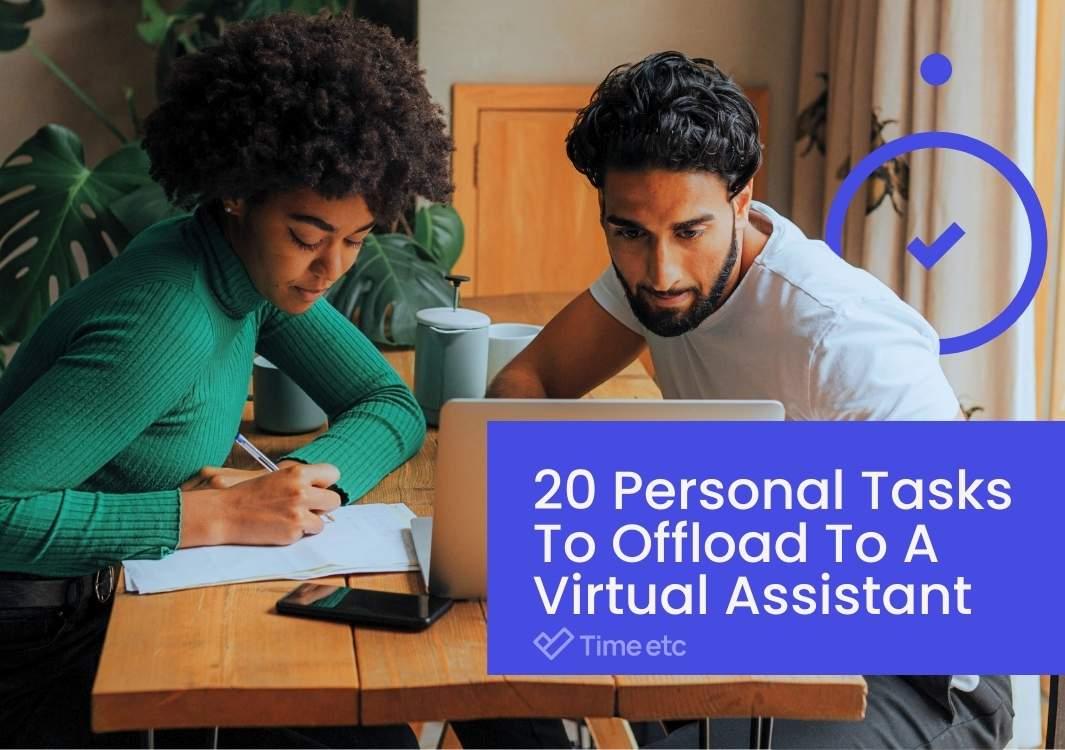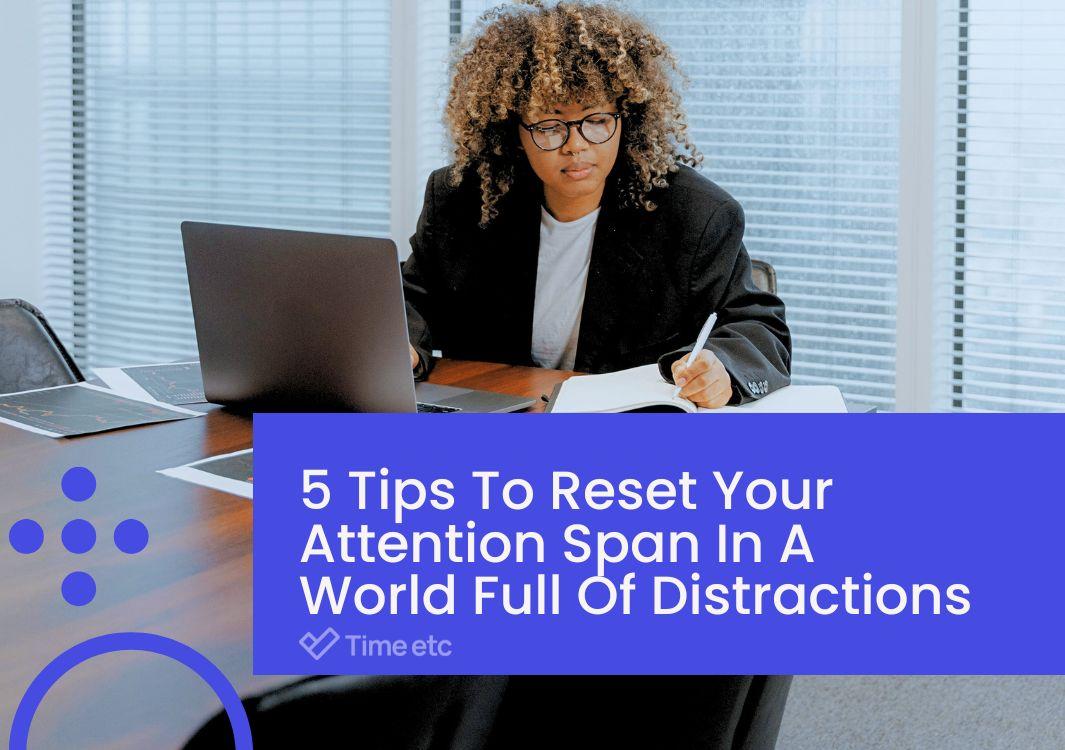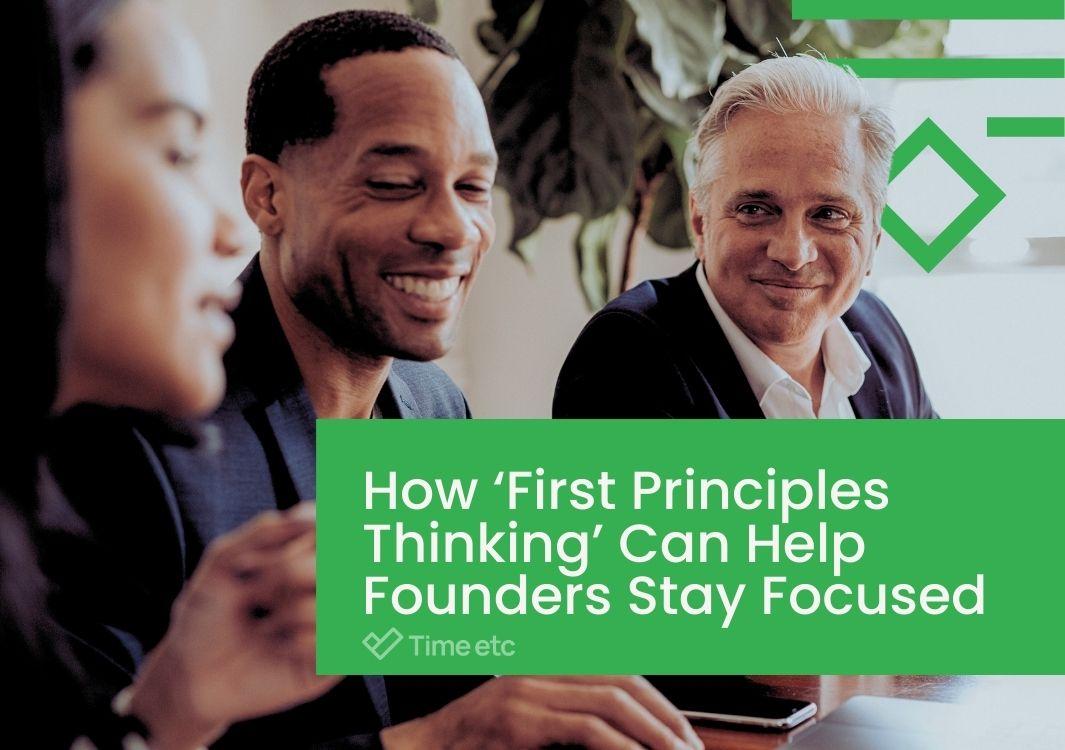As a business owner, you're constantly thinking of new ways to crush your goals, put out fires, and get your business to the next level. But managing your time wisely can be tricky, especially with distractions lurking around every corner.
We've all been there, right? Wide-eyed and ready to tackle the work week, but just before crossing off the first to-do list item, the inevitable occurs: an unexpected phone call, a sudden knock on the door, an avalanche of text notifications accumulates on your phone—then suddenly, it's lunchtime, and you're left wondering where the day went.
While it is impossible to avoid all distractions, you can definitely do a few things to minimize their impact on your business. So whether you're just starting your entrepreneurial journey or have been in the game for years, it's mission-critical to be aware of the dangers of distractions and how to overcome them.
Luckily, we've got the scoop!
Here are ten strategies for overcoming distractions...
1. Set your most important goal for the day
When we try to juggle multiple goals at once, we often fail despite our best efforts. But no need to throw in the towel just yet! Research has shown that you're actually more likely to commit yourself and be successful if you focus on one goal at a time rather than trying to achieve many simultaneously—setting your sights too high and on too many objectives can prevent even the most motivated person from reaching their full potential.
Instead, think about what today's most important goal is—the one that will move your life and business forward in some way—and then position this one goal as the main focal point of your day.
Utilize the rest of your time to take small actions towards this goal, and you'll find that not only are distractions less likely to throw you off track, but you'll feel more productive, happier, and focused than ever.
2. Batch your tasks around your daily goal
Getting more done is just the beginning! By organizing tasks around a central goal, you can ensure that everything is moving in the direction of accomplishing it. This is because when you have a clear objective in mind, it's easier to concentrate on the items that matter most rather than getting distracted by other less important tasks.
Some other key advantages to task batching include:
- Helps to avoid context switching—jumping back and forth between tasks that require different "headspaces" and mental resources. According to UCI researchers, frequent context-switching increases levels of cortisol (a stress hormone) produced in the brain, leaving you feeling mentally drained and worn out.
- Promotes deep work—a state of peak distraction-free concentration that pushes your cognitive capabilities to their maximum potential, allowing you to easily learn challenging things and produce quality work quickly.
- Reduces decision fatigue—when we have to make lots of decisions throughout the day, it can be exhausting. Batching more minor decisions into larger ones minimizes the number of choices you have to make, leaving you with more energy and mental clarity at the end of your day.
- Improves goal visualization—seeing all the steps that need to be taken for a project's success. When you begin by thinking about where you want to end up, it's easier to stay on course.
- Decreases burnout—physical or emotional exhaustion accompanied by a sense of reduced accomplishment and low self-worth. When burned out, it's hard to think clearly or make good decisions.
3. No more multi-tasking
Many studies on this topic have reached the same conclusion: multi-tasking reduces our efficiency and effectiveness much more than it enhances them. In fact, multitasking has been found to negatively impact our memory, productivity, creativity, and problem-solving skills.
So what's the problem with multi-tasking? According to neuropsychologist Dr. Cynthia Kubu, "The human brain is not designed to multitask well. When you try to accomplish two things at once, each one suffers." This doesn't just mean that we can't do two things at once as well as if we did them separately; it means that we're likely to perform worse when multitasking than if we stay focused on just one task at a time. Moreover, multitasking when you should be focusing on a cognitive task may reduce your IQ by up to 15 points—the equivalent to if you'd been awake for 24 hours with no sleep at all!
And the same goes for you media multitaskers out there! A 10-year study from Stanford University revealed that people who regularly engage in multiple forms of media at once (scrolling on your phone while watching TV, for example) do worse on cognitive tests than people who concentrate on one thing at a time.
4. Put your phone away (if you can)
When it comes to mobile devices, there is no doubt that they have become some of humanity's greatest sources of distraction. Most apps and websites have been crafted to be as addictive and user-friendly as possible, and according to neuroscientist and psychologist Daniel J. Levitin, we have created more information in the last decade than in all of human history before that, so we know there's never a shortage of things to look at.
"Our brains are hardwired to pay attention to new and exciting things," says neuropsychologist Dr. Matthew Croger, "so the smartphone is really a perfect match."
Shockingly, we might not even have to be using our phones for them to affect our ability to focus and be productive. Simply hearing your phone buzz is enough to distract you and impede your performance. And have you ever thought you could feel your phone go off, but when you checked it there was nothing new? "Phantom vibration syndrome" is a common mental phenomenon where your brain is tricked into thinking you felt it vibrate when it’s in your pocket, especially when you’re anxious or already anticipating a call or message.
A 2017 study by the University of Texas at Austin found that the mere presence of your phone—even if it’s switched off—can reduce your brain power, which means that simply relying on willpower alone to not check your phone might not be enough to make sure you stay focused.
Although, it's understandable that putting your phone away completely during the day is much easier said than done for most business owners.
I’ve deleted all email apps from my phone as let’s be honest, the vast majority of emails are not urgent, so they don’t need your attention every time a notification pings on your smartphone or computer. And apart from very close friends and family members, I screen all my phone calls so I can use the method of communication that’s most efficient for me to respond back. I now reach for my phone considerably less often than I used to during working hours because of this.
Here are some more tips that can help you cut down on device-related distractions:
- Delete all non-essential apps
- Turn off notifications to non-work-related apps
- Consider getting a landline for the office
- Set up a "do not disturb" function on your phone
- Set up an email auto-response
- Invest in time management or focus apps for your devices
5. Put headphones on
If you're easily distracted by environmental noise, try wearing some noise-canceling headphones. They'll block out external sounds and help keep your focus on the task at hand. They also help by providing a sense of privacy from people around you. If you're in the office or any public place, wearing headphones can be an effective way to signal that you're "in the zone" and not bother you, if possible.
However, if you find silence to be even more deafening and distracting, it can be tempting to listen to your favorite music, podcast, or radio station. There’s always been a debate about whether listening to audio while working is helpful or distracting, but if you're one of those people who prefer background noise while they're working, experts agree that music with no lyrics is the best option.
Studies show that listeners end up focusing on lyrics rather than the task at hand, as it re-prioritizes the information you’re trying to process. If you're listening to a song you know, you’re inclined to sing along, even if it’s in your head. If it’s a song you don’t know, your mind will be anticipating what comes next or trying to make sense of the messages.
With no lyrics, there’s nothing to dissect. As such, electronic lo-fi music, ambient noise, and video game soundtracks have all been found to be effective at improving focus for listeners.
See: The Perfect Playlist For Productivity: Can Music Affect Your Focus?
6. Optimize your workspace
A cluttered desk can distract you from getting things done.
Why is this?
A recent research study by the Princeton Neuroscience Institute showed that when there are a lot of visual stimuli present, they compete for your attention. Simply put, when there is a lot going on in your view, it will take extra concentration to complete the task you're working on.
However, be mindful that clearing up doesn't turn into a time-waster, as procrastination sometimes masquerades as action. If you've ever had essential tasks to do, but instead of doing them, decided it was the perfect time for a cleaning frenzy—clearing out old drawers and reorganizing your shelves (among other chores)—you are certainly not alone.
You might think you're being productive, but in reality, you are avoiding the real task at hand. Setting a timer can help make sure you stay on track and avoid getting carried away.
7. Use the Pomodoro technique
Staying focused on one task for an extended period of time can be a challenge, but the costs of our attention being constantly diverted can quickly add up. Recent research suggests that it takes the average person 25 minutes and 26 seconds to return their full attention to a task after they've been interrupted by distractions. Considering that most people are interrupted at least once per day, this equates to around two hours of lost productivity every week.
Many successful entrepreneurs swear by the Pomodoro Technique for strengthening their focus muscle. It involves using a timer to set 25-minute work periods followed by five-minute breaks in between. The idea is that this structure helps you avoid distractions and stay focused, so it's worth trying out if you struggle to stay on track with specific tasks.
This technique also helps to avoid multitasking while increasing accountability by forcing you to be more conscious of your valuable time and energy.
8. "Dump" distracting thoughts
Instead of trying to totally ignore your distracting thoughts (which is often much easier said than done!), create a place where you can put them aside temporarily—a "brain dump" or "parking lot". This is an excellent strategy because it allows you to capture all of your ideas in one place, sort through them when you are ready, and decide which ones are worth pursuing.
"For people who constantly have racing thoughts, anxiety, or tend to overthink things, this strategy can be very beneficial," says psychologist Dr. Marsha Brown. "Writing things down takes those thoughts out of their head, so they're not just bouncing around up there. It puts them somewhere—so the person knows it's written and can be taken care of later."
Some people like to get all their distracting thoughts out of the way before beginning work in the morning, while others prefer to jot down ideas as they occur throughout their day. Either way, you're far less likely to get sidetracked or risk losing any spontaneous lightbulb moments that might come to you while working.
9. Schedule time for distractions
While attention is traditionally thought of as being a sustained, undistracted state, research from Princeton University and the University of California, Berkeley suggests that we regularly switch between short spans of attention and stretches of distraction, during which we unconsciously stop and scan our surroundings to see whether there is something beyond our primary focus that may be more significant.
Taking this knowledge into account, sometimes the best way to manage distractions is to plan for them to minimize their impact. Rather than risk being derailed every time you get the niggling urge to check social media, watch YouTube videos, or read an article you've been meaning to catch up on, give yourself time in your schedule each day to take a break and do whatever it is that you want or need. This allows you to do so guilt-free, knowing that it won't impact your productivity for the rest of the day.
10. Delegate distracting tasks to a virtual assistant
For entrepreneurs who have built their venture from the ground up, it's easy to feel like you must take on the entire burden of your list of obligations. Yet, when that leads to getting sidetracked from important tasks or feeling swamped by all that needs to be accomplished on a daily basis, both your business and your well-being can suffer.
This is why offloading low-level, distracting work can be crucial for maintaining your sanity and keeping your business running smoothly.
Virtual assistants (VAs) are independent professionals who provide administrative or executive support to their clients from remote locations. Anything that's tedious or time-consuming—from scheduling meetings and maintaining the minutes to creating marketing materials and managing your inbox—you’re bound to find a skilled VA who can take it off your hands.
But while they won't be able to do everything on your to-do list, offloading tasks to a virtual assistant reduces the number of demands on your time and, consequently, the number of distractions that hold you back from staying focused on the important work that will help you achieve your future goals.
For example, offloading just one hour of distracting tasks every working day for a year means you could reclaim the equivalent of 29.5 eight-hour workdays, or just under six whole working weeks!
And since virtual assistants are not full-time employees of your company, they provide great savings compared to hiring full-time staff. You only pay for the productive time they spend working on tasks for you, so no need to worry about squeezing more full-time salaries, benefits, office supplies, or equipment into your budget.
What's the bottom line?
Knowing how to avoid distractions is critical for any business owner wanting to join the ranks of the most successful entrepreneurs. Even a seemingly insignificant interruption can have a domino effect on the rest of your day—leading to missed opportunities, wasted time and energy, and decreased productivity.
If you want to take back control of your time and stay focused on what matters most, Time etc is here for you. We are dedicated to helping hardworking and ambitious entrepreneurs do more, achieve more, and earn more by matching them with the best virtual assistants for their businesses.
Speak to our expert team to get started, and we’ll set you up with a dedicated professional based on the skills and experience you need.
Or try a skilled virtual assistant for free today!







